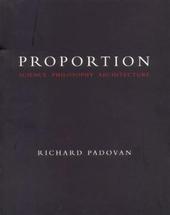
|
Proportion: Science, Philosophy, Architecture
Paperback / softback
Main Details
| Title |
Proportion: Science, Philosophy, Architecture
|
| Authors and Contributors |
By (author) Richard Padovan
|
| Physical Properties |
| Format:Paperback / softback | | Pages:402 | | Dimensions(mm): Height 248,Width 191 |
|
| Category/Genre | Theory of architecture
Architectural structure and design |
|---|
| ISBN/Barcode |
9780419227809
|
| Classifications | Dewey:721 |
|---|
| Audience | | Undergraduate | | Postgraduate, Research & Scholarly | | Professional & Vocational | | General | |
|---|
| Illustrations |
80 Tables, black and white
|
|
Publishing Details |
| Publisher |
Taylor & Francis Ltd
|
| Imprint |
Spon Press
|
| Publication Date |
9 September 1999 |
| Publication Country |
United Kingdom
|
Description
When Rudolph Wittkower's Architectural Principles in the Age of Humanism was published fifty years ago, proportion was one of the central issues in architectural debate. Since then it has fallen out of favour to the extent that it no longer has a place on most architectural syllabuses and the subject is surrounded by an aura of mystery. This original new book starts by asking the question: how did this come about? Richard Padovan starts Proportion by responding to the theories of Wittkower and explaining the theories of 'abstraction' and 'empathy'. He moves on to an orginal interpretation and exposition of the mathematics of proportion. The main body of the text traces the interplay of abstraction and empathy though the history of science, philosophy and architecture from the early Greeks through to the two early twentieth-century architects who made proportion the focus of their work: Le Corbusier and Van der Laan. The book includes new proportional analysis of key buildings. Finally, the author reflects on the present and future role of proportion in architecture.
Reviews"Padovan's important new book surveys 25 centuries of theoretical concern for proportion in architecture in relationship to philosophy and science." -"Choice "Padovan had much to offer all architects, not only in respect of what they design but also of how they see the world as a whole. And that is quite and achievement "Architectural Review."
|